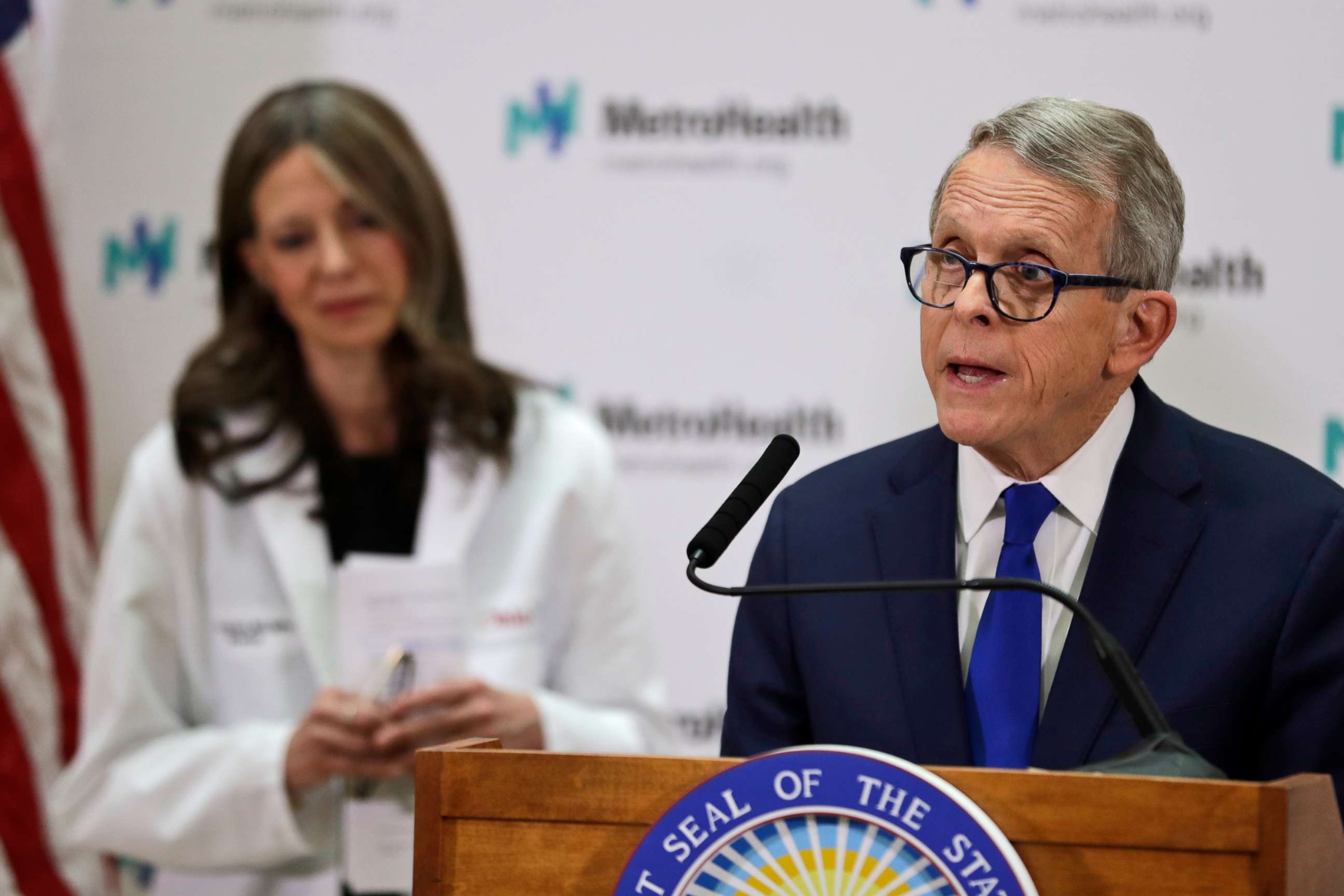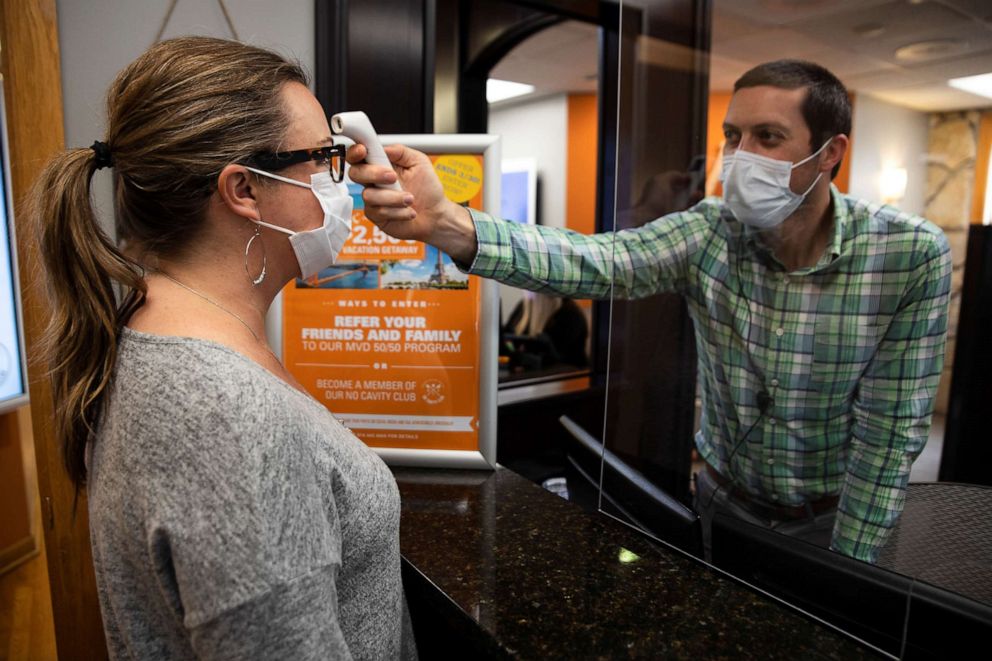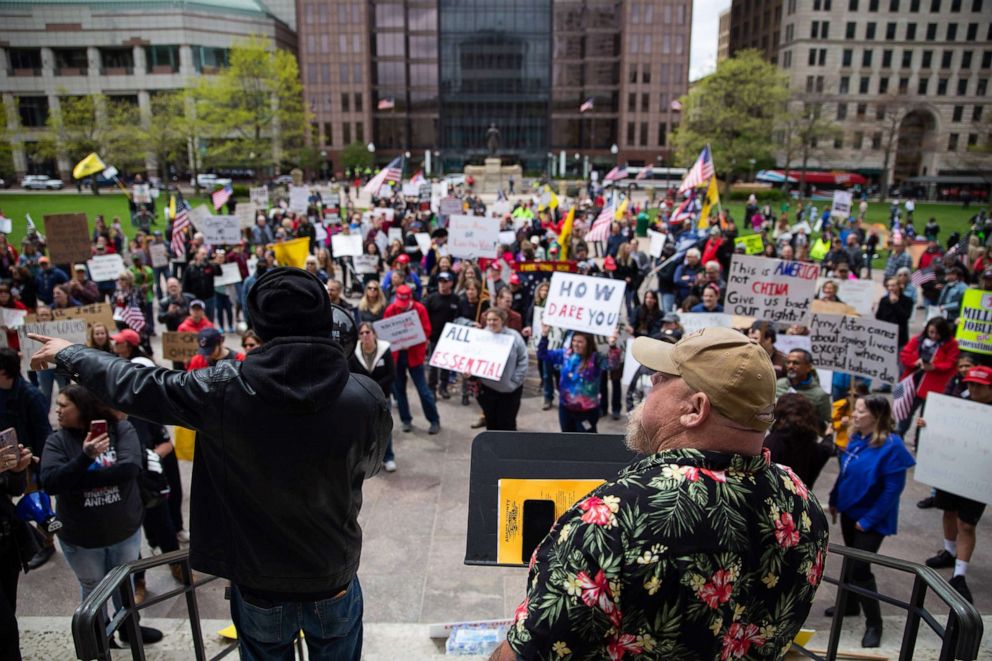Challenges to Ohio's stay-at-home order mount as GOP lawmakers attempt to limit health director's power
Two bills aim to reopen the state faster.
Since March 22, more than 11 million Ohioans have been under a stay-at-home order. In recent weeks, the executive order has been met with protests and challenges -- the latest from Republican lawmakers looking to limit the authority of the state's health department during the coronavirus pandemic.
On Wednesday, the Ohio House passed a bill that would limit the power of the state health director and give the legislature oversight of state health pandemic orders. On the same day, a Republican representative introduced another bill, dubbed the Need Ohio Working Act, that would speed up the state's reopening by giving the Ohio General Assembly approval over any "draconian orders" from the governor or Ohio health department that shut down the economy.
Ohio Health Director Dr. Amy Acton and the person who hired her, Gov. Mike DeWine, have quickly become unlikely national figures as the pandemic has spread. The New York Times called Acton "the leader we wish we all had," and DeWine has been profiled admiringly in Time magazine and the Washington Post, and on the BBC.

The state's early mitigation measures included canceling Columbus' popular Arnold Sports Festival, which was scheduled to start March 5, before there were any confirmed COVID-19 cases in Ohio. The Republican governor declared a state of emergency on March 9 when there were only three confirmed cases. On March 12, Ohio became the first state to close schools for an extended period. The stay-at-home order followed on March 22.
"I think that clearly, Gov. DeWine will have to be chronicled as an early adopter of best practices, and taking political risk because he knew what he had to do," Daniel Skinner, Ph.D., a health policy professor at Ohio University and host of the WCBE health care podcast Prognosis Ohio, told ABC News. "He saw this in ways that other governors did not."
Ohio has had 21,576 COVID-19 cases and 1,225 deaths, according to the latest data from the state.
"In flattening our curve, it's bought our state a lot of time," Skinner said of the aggressive measures. "We never had capacity problems in our hospitals. That's testament to that."
A revised executive order subsequently extended the lockdown until May 29, with provisions for reopening businesses over the coming weeks.
Health care providers, general offices, and manufacturing, distribution and construction businesses have since been allowed to reopen, with retailers to follow suit on May 12.
Still indefinitely closed are schools, restaurants, bars, barbershops, nail salons, child care services, gyms, movie theaters, museums and other nonessential businesses. DeWine said this week he should have an announcement about the timeline for reopening those businesses, including restaurants, daycare centers and hair salons, on Thursday.

An April 27 poll from Baldwin Wallace University found that 85% of Ohioans surveyed approved of DeWine's handling of the pandemic. But as the state begins to reopen, some say it's not happening fast enough.
Last week, Ohio House Speaker Larry Householder criticized DeWine's plan to keep small businesses closed until May 12 while larger chains are open. "As long as small retailers continue to be shut down while national chains are allowed to remain open, government is assisting in the demise of many great small businesses," the Republican said in a statement, which also said the Ohio House felt "disregarded" by the governor's administration.
The Ohio House bill that passed Wednesday would limit any stay-at-home order issued by the Ohio health department to 14 days, with extensions subject to review by a House-Senate committee. It passed the House 58-37 and now goes to the Senate for approval.
The Need Ohio Working Act is expected to be referred to a standing committee for further consideration. "It's time to stop the madness and reopen Ohio," State Rep. John Becker, a Republican who introduced the bill, said in a statement. "People tell me overwhelmingly that they want to get back to work and reopen society."
Nearly 1 million people in Ohio filed for unemployment over the last six weeks, the state reported Thursday.
The Ohio Restaurant Association is pushing to reopen dine-in restaurants as early as May 15.
"Every week that goes by will claim another percentage of restaurants that will never reopen, jobs that will disappear permanently, and communities that will be left without their local restaurants that are often the cornerstones of their downtowns and neighborhoods and fuel so much economic development," the organization said in an April 27 statement.
The bills follow a string of protests at the Ohio Statehouse against the governor's stay-at-home order, as well as one in front of Acton's residence over the weekend -- a move DeWine criticized as "obnoxious."

DeWine also received backlash after mandating last week that all retail store customers wear masks; a day after announcing the measure on April 27, he walked it back, instead saying masks are strongly recommended.
In response to Wednesday's vote, DeWine said in a statement that "creating more uncertainty regarding public health and employee safety is the last thing we need as we work to restore consumer confidence in Ohio's economy."
The actions in the legislature to limit the powers of the health director show "cracks" in the state's so-far exemplary model, Skinner said. DeWine's indecision on masks concerned some in the public health community that the state was also veering off course, he said.
"I think we're on a good trajectory if we can stick with it," he said. "That could all be undone in the next weeks or months if we veer from that course."
What to know about the coronavirus:
- How it started and how to protect yourself: Coronavirus explained
- What to do if you have symptoms: Coronavirus symptoms
- Tracking the spread in the U.S. and worldwide: Coronavirus map
Tune into ABC at 1 p.m. ET and ABC News Live at 4 p.m. ET every weekday for special coverage of the novel coronavirus with the full ABC News team, including the latest news, context and analysis.




